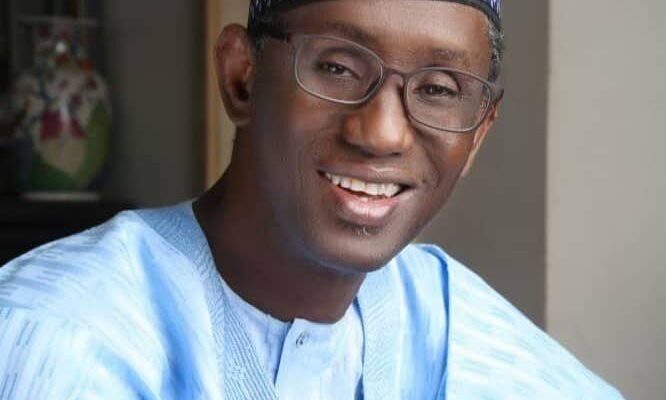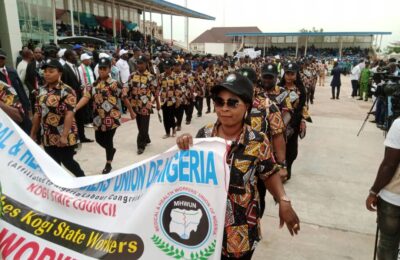NSA; Ribadu new Approach to Nat’l Security—Dr. Ohikere
A former Kogi state information commissioner and the Managing Director of the APC NewsOnline, Dr Tom Ohikere has said that the appointment of Mallam Nuhu Ribadu as National Security adviser is an excellent decision by an administration determined to approach national issues and security from a new and different direction.
Ohikere made this known on Friday while reacting to a statement by former foreign affairs minister, Dr Bolaji Akinyemi who impugned on the appointment of Mallam Nuhu Ribadu as the new national security adviser on the basis of his lack of military background.
Speaking to Sunday Independent in Lagos, Dr Akinyemi who is now the Board of Trustees (BOT) Chairman of Project Victory Call Initiative (PVC-Naija) said that Ribadu will face challenges in his new position as the Service Chiefs may not consider him fit for the position.
Akinyemi said, “The Office of the NSA coordinates the security thrust for the country. In a way, this job is more important and hands – on than that of the Minister of Defence. “It therefore means that someone from Intelligence or with a background in the military has this job.”
However speaking on the comment by the former minister, Ohikere said Akinyemi sees national security as hinging solely on military needs and requirements and that that perspective has long been denounced. According to him, national security is a much broader concept that requires input from a variety of sectors and professionals.
Ohikere said, ” While national security is usually and traditionally seen in terms of the military components and territorial security of a state, it also goes beyond that to include human (citizens) security, that includes such elements as food security, respect for individual rights, rule of law, respect for minority and cultural rights, social welfare and justice among others. While military background has always been a requirement in the appointment of our national security advisers much of it can be attributed to our history of military intervention in government in which fraternal military coursemates dominated key sensitive and important positions in the government for purely reason of regime security particularly since the position of the National Security Adviser (NSA) started in 1993 during the military government of Ibrahim Babangida, parading the likes of Aliyu Mohammed Gusau, Ismail Gwarzo, Abdullahi Mohammed, Abdullahi Sarki Muktar, Kayode Are, Andrew Azazi, Sambo Dasuki and Babagana Monguno.
“While the National Security Adviser is appointed by the President and does not require confirmation from the Nigerian Senate. However, his duties varies from administration to administration; and depends, not only on the qualities of the person appointed to the position, but also on the style and management philosophy of the incumbent President. Nigeria has had its own fair share of autocratic military rule and the oppression and suppression that goes with it, with ordinary citizens considered as national security threats, a classification that has extended far into the fourth republic in Obasanjo’s administration and prolonged by the advent of the Boko Haram insurgency which lasted till the last days of the Muhammadu Buhari administration, Ohikere added.
Speaking further, Ohikere said, “With the subsiding situation and the transition to stability and a new dispensation of things, anchored on renewed hope agenda, it is clear that it will not be business as usual. That the government will not base its national security approach on a purely militaristic – state centric approach but on the human security approach, anchored on human empowerment and development and respect for the rights of citizens and rule of law. The current president is adept in his knowledge of Nigeria’s political history having been in the forefront of the struggle for the restoration of democracy in the country, and has subsequently operated at the corridors of power, learning lessons along the way that have eluded others, particularly the hitherto traditional political classes.
“Nuhu Ribadu we know is a fine and diligent gentleman with extraordinary intellectual endowment, a requisite that earned him the first chairman of the Economic and Financial Crimes Commission (EFCC) between 2003 and 2007, and was Chairman of the Petroleum Special Revenue Task force between 2012 and 2014. Like Ismail Gwarzo, Ribadu is also a police officer who rose up to the rank of assistance inspector general of police, learning the rungs and intricacies of intelligence gathering and national policing particularly with with his attendance of several high powered courses within and without the country, little wonder why he was made the first chairman of the EFCC.
” While the current president is pursuing a national security approach based on human security anchored on rights and rule of law, Mallam Ribadu has an educational background in law, graduating from Ahmadu Bello University in 1983 with a bachelor of laws degree, and subsequently bagging a Master of Laws degree from the same university. We know that his penchant for learning saw him after leaving the EFCC to become in April 2010 a fellow of the Center for Global Development, an institution based in Washington and London and focusses on International development, leading debt relief programs, particularly in Nigeria and Liberia. An experience and knowledge that would definitely be beneficial to his presence office of National Security Advisers especially within the national security philosophy of the present administration. Even in the national intelligence agencies of advance democracies, which Nigeria aspires to be, most often than not the head of their national security agencies, and in some cases defense intelligence agencies are not always men in uniform or men who have worn the uniform before or have military background.




